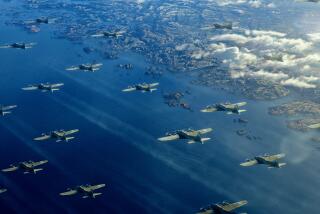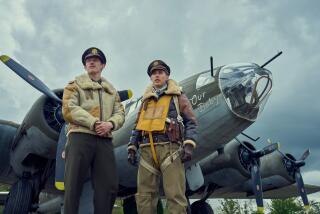Nuclear Bomber Crews Train for Assignment They Don’t Want to Do
- Share via
SACRAMENTO — Armed security guards patrol the barbed-wire fence on foot and in armored vehicles. Inside the enclosure sit four B-52s, an air tanker and their crews--waiting for an assignment they hope never comes.
“It scares me,” says Capt. Jim Kanabay. “I dread the thought of having to do some of the things we’re trained to do.”
Kanabay is the radar navigator, the modern version of a bombardier, on a B-52 bomber crew at Mather Air Force Base, a crew that could be called on to drop nuclear bombs on an enemy target.
It’s not a job they would relish, crew memberssay.
“I think a lot of guys are out here because they don’t want to go to war,” Kanabay says. “Sometimes I get a feeling that people in town think we’re a bunch of bloodthirsty, war-mongering boys . . . who enjoy destroying things. That’s not true.”
Says 1st Lt. Cal Fuqua, “We’re not all Dr. Strangeloves. I’m a humanist. I care about people.”
But Capt. Sean Clarkin, an electronics warfare officer, says crew members don’t see things in shades of gray as far as the United States and its potential enemies are concerned.
“I know it sounds really hokey in the ‘80s to say it, but everybody out here has a deep hate of communism,” he said. “They love America and they love their freedom. There’s not a lot of ambiguity out here. We know who the bad guys are.”
The bomber crews spend one week out of three on alert at Mather’s Strategic Air Command alert pad. Inside the fence, besides aircraft, are a tennis court, a swimming pool and a building that’s a cross between a motel and a fraternity house. Facilities also include a library and a dining hall.
“We’re technically on duty 24 hours a day,” says 1st Lt. Steve Addison, an aircraft commander. “But after we check the airplane and do our required training, they don’t mess with us a whole lot. We have a lot of free time to study or do whatever you want to.”
Occasionally, the crews fly a practice alert. But until they are in the air and decode a message, they don’t know if it’s the real thing.
“In this age of satellites and everything, they (the Soviets) watch everything we do, just like we watch everything they do,” Clarkin says. “Every time we take one of those airplanes out and fly low-level routes, they see us doing that. Those training missions send a message that we’re ready to do it, and then they see us coming out here and they know we’re here. We just send that message.”
The fliers won’t discuss the specifics of their job, but even when they talk in general terms they seem to take pains not to use the world “nuclear.”
“We are not allowed to use that word,” Clarkin says.
Adds Capt. Don Zimmerman, a co-pilot. “We are not anxious to do our wartime duty. It’s not like I want to go out and execute God’s judgment at anybody at all, not in the least.
“But I really think that what we might be called on to do would be the right thing to do. I feel very strongly about that. We don’t believe that the American people are going to allow the military, you know, the President, to send us to commit wars of aggression. That’s not what we’re here for.”
More to Read
Sign up for Essential California
The most important California stories and recommendations in your inbox every morning.
You may occasionally receive promotional content from the Los Angeles Times.













